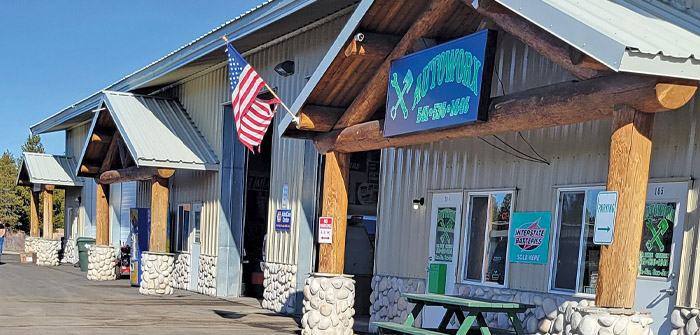(Businesses such as this are drawn to La Pine’s fully infrastructured, 330-acre Industrial Park | Photo courtesy of Andrea Hine)
Admitting that “by and large, our business climate is very much the same as last year,” Patricia Lucas, executive director of Sunriver-La Pine Economic Development (SLED), has her hands full.
Having “facilitated the sale of more land in 2021-2022 than had been sold in the previous decade,” in the words of La Pine City Manager, Geoff Wullschlager, Lucas currently has 11 projects in the pipeline — in health care, consumer products, forestry, alternative energy, advanced manufacturing, and fabrication. With one involving a multistate company, the projects represent an estimated private sector investment in new capital of $44.5 million, totaling 63,400 square feet of building space, and the creation of at least 58 new jobs.
In her SLED position since March 2020, Lucas has seen that the amount of time involved in bringing a given project to fruition “really depends” on multiple factors — the shortest project taking about a year and the longest one — Legend Cider — taking three years. Were it not for the close relationship forged during the protracted process with owners Adrianne and Tyler Baumann, Lucas said in retrospect that Legend might well not have remained in La Pine.
Close Relationship with SLED Credited for Legend Cider’s Successful Expansion
“This one was really challenging,” Lucas admitted. “I was in constant communication with the Baumanns, and had to keep my finger on the pulse of multiple components, only the first of which was identifying a building — as Legend, having run out of space at its initial La Pine location, sought a new site for its production operations and tasting room.
The Baumanns readily acknowledge that deciding to move proved to be only the beginning of their relationship with SLED’s Lucas. They initially set their sights on converting what they described as “a fixer upper with multiple issues” — from lack of heating, to an outstanding water bill of more than $1,000, to tax and leasing obstacles” — but after several years, realized the futility of their efforts.
Utilizing Lucas’ expertise and counsel in areas such as site selection and acquisition, the Baumann’s shifted course and were eventually able to “convert a decrepit building and overgrown vacant lot covered in barbed wire into something to be proud of.”
Effusive in crediting the role that Lucas played, Adrianne Baumann said that “Patricia provided guidance at every turn during an especially hard relocation. She helped find a location that suited our needs, and has been there for us every step of the way. I feel that I can ask her for help with anything, and if she doesn’t immediately know the answer, she will work hard to find out. I call her my business fairy godmother, and know we would not have been able to stay in La Pine without her.’
Effect of Interest Rates and Labor/Construction Costs on Investments
Above and beyond building strong relationships as she did with the Baumanns — in her mission to help “move, start, and grow traded-sector businesses to purposefully create a balanced and diverse economy at the local level and for the region,” — Lucas has to deal with certain critical factors beyond her control that determine the willingness of companies to invest in commercial and industrial property.
The first is interest rates — which the Federal Reserve increased 11 times between March 2022 and July 2023, tightening policy from near-zero rates to a range of 5.25-5.50 percent. “Clients are constantly weighing whether or not they’ll get a good return on their investment,” said Lucas. “And when interest rates are high, people wait as long as they can to invest capital.”
The second factor is labor and construction costs that continue to escalate, both locally and nationally. Lucas noted as an example that “one client faces construction costs that have increased by 50 percent in less than a year.”
Overall, despite these deterrents, Lucas said that “we still have a lot of interest in our area,” and described La Pine’s climate as “well positioned and very welcoming” with local government officials “willing to work hard to facilitate economic development” in Oregon’s second-fastest-growing town.
Incubator Planned to Support Early-Stage Businesses
Enhancing the town’s advantages in attracting new investments is a recently announced small business incubator that will be located in La Pine’s 330-acre Industrial Park, which she described as having “the most competitively priced industrial space in Central Oregon.”
Lucas said that tenants will be provided with a variety of resources and assistance that include:
- Technical assistance for starting a business
- Individualized business counseling in collaboration with COCC’s Small Business Development Center
- Collaboration with business resources at the Deschutes Public Library
- Business plan assistance
- Guidance with financing for start-up and growth
- Mentoring assistance on concept, critical expertise, and strategy
- Assistance in marketing, export, government procurement, and workforce development
- Increased networking opportunities
- Access to potential investors and partners
According to Geoff Wullschlager, La Pine’s city manager, the incubator will be about 5,000 to 8,000 square feet, enough to house up to seven tenants.
Mobile Unit Will Facilitate Local Work Force Development
And there’s more on the horizon. To facilitate local work force development, COCC — in partnership with the La Pine Parks & Recreation Department — is in talks to create a mobile unit offering both pre-construction classes and an apprenticeship program that will give job aspirants a variety of certifications. “Education can be delivered in lots of different ways, not just traditional settings,” said Lucas. “I’m excited about the potential of this approach.”
lapineoregon.gov/ed/page/sunriverla-pine-economic-development-sled




